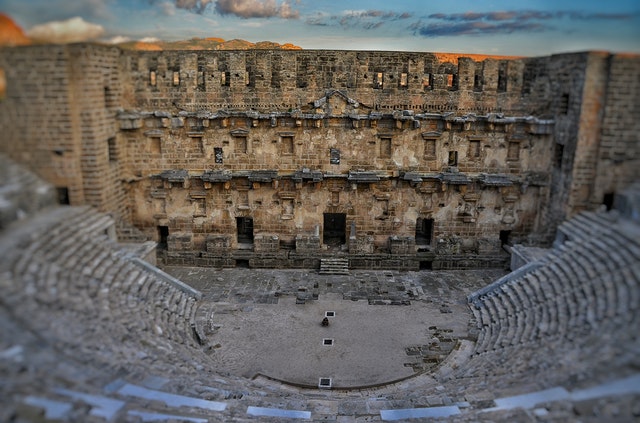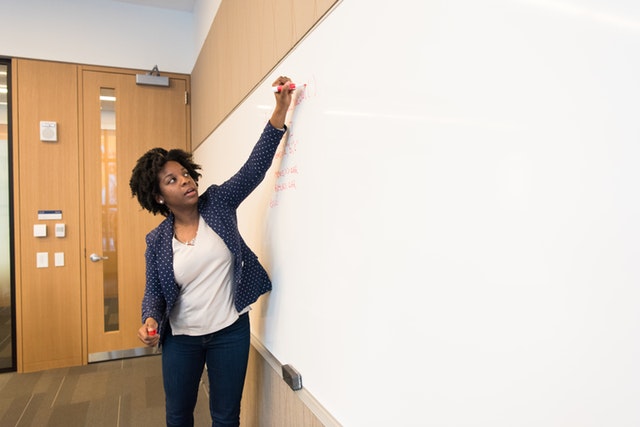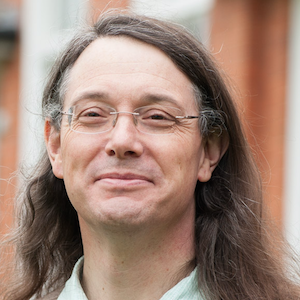This blog post is written by Dr. R. Harris, an Associate Professor of History Education at the University of Reading’s Institute of Education. It captures key arguments as reported in Dr. Harris’s recent co-authored article of the same title as this blog’s.
Dr. Harris can be reached via Twitter here.
Setting the scene …
We live in a world where people talk about future economic prosperity being dependent on a ‘knowledge economy’. This places great importance on the role of education in economic growth. However, there is disagreement about what type(s) of ‘knowledge’ is(are) going to be important in the future.
The Organisation for Economic Co-operation and Development (OECD) (2001, p. 100) argues that the ability to “use information and communication technologies (ICT), to solve problems, to work in teams, to supervise and lead and to undertake continuous learning” are key areas for development. This view stresses the value of developing generic competencies and skills, such as problem solving, team working, networking and ‘learning how to learn’. The knowledge economy is also often linked to developing knowledge and skills associated with science, technology, engineering and mathematics (STEM) subjects.

As a consequence, many education systems around the world have experienced significant reforms, especially in the area of the school curriculum. The curriculum has been a particular focus of criticism for being a “one size fits all” model, lacking flexibility and choice, and for encouraging the transmission of knowledge (Robertson, 2005; Winter, 2012). Yet, many curriculum forms do not play close enough attention to the debates about ‘knowledge’, what it is and what makes certain forms of knowledge valuable.
The argument presented in my recently published co-authored paper focuses on the place of non-STEM subjects, like history, and the potential of a subject like history to provide a powerful means of equipping people with the sort of cognitive capabilities expected in a knowledge economy.
Three ways we can think about (historical) knowledge
The debates about knowledge in history do reflect the more general debates about knowledge in education, so history provides a useful way of exploring these issues. Essentially, according to Young and Muller (2010), there are three ways we can think about knowledge. One is focused on ‘core’ knowledge – in the context of history, this would mean a focus on knowing dates and events. In many ways what could be termed a ‘traditional’ way of thinking about history. This has the benefit of providing access to a common heritage. However, it has been criticised for expecting students simply to consume preordained bundles of knowledge, which somebody has decided are important to know.

A second model is knowledge of ‘how to learn’. In this model, the availability of technology means people can access information very easily, so they do not need to be taught particular knowledge (as they can find it when they want to). Instead, they need to learn how to find and handle the knowledge they encounter; in history this would mean searching the Internet for information about what happened in the past, rather than being told what happened. Although this seems to have a strong common-sense appeal, young people are not taught to distinguish between different types of knowledge and forms of thinking, instead knowledge is regarded as information, which in fact downplays the value of knowledge. This can limit young people’s understanding of the world to their own experiences.

The third model, is known as a ‘disciplinary’ approach. and one which is advocated here. Instead of knowledge simply being seen as information, there is an understanding that knowledge is constructed and is not absolutely fixed (i.e. we can change our understanding of things). This is based on the idea that different subjects or disciplines have different rules for trying to establish what is regarded as the best truth at that moment in time; for example in history this means that people work with evidence to work out what happened in the past, but our understanding of the past will change as we encounter new evidence or look at old evidence in new ways (which often reflects how our society looks at the world). Adopting a ‘disciplinary’ approach to knowledge, i.e. introducing young people to the ways in which the past is pieced together, means our understanding of the past can also be modified. This is seen as ‘powerful knowledge’, as it allows young people to engage more analytically with knowledge and to be able to question it.
The third model is seen as better than the first model – in this sense the first model presents ‘knowledge of the powerful’, i.e. what an elite group has decided is worthy of knowing. It is also seen as better than the second model because this emphasises information retrieval and information processing skills, rather than the deeper analytical thinking of this third model. It is argued that this has the potential to contribute more to a knowledge economy than a more generic ‘learning how to learn’ approach.

Research rationale, design and key findings
Although this disciplinary approach to knowledge is widely accepted within the history education teaching communities in England and New Zealand, little is known about what history teachers actually do once in the classroom. Drawing on small-scale, in-depth studies from each country it seems that teachers do advocate a disciplinary approach in theory, but in practice it seems there is more that can be done.
Specifically, a study of ten History departments in secondary schools in England shows that most teachers get students to think about important historical concepts such as why things happen, what has changed and what has stayed the same and so forth. However, working with evidence to see how the past is constructed, and looking at historical interpretations (i.e. how views of the past can change and differ), which would be at the heart of a strong disciplinary approach, are covered less extensively. In New Zealand, it was clear that the examination courses meant that teachers only covered the ideas that needed to be covered; for example, few teachers entered their students for papers which required students to work with sources and different interpretations, because this required students to have lots of contextual knowledge to make sense of the sources. So although there is some attempt to teach a disciplinary understanding of history, this is underdeveloped. Although a disciplinary approach to understanding history is important, this model does not pay much attention to what historical knowledge could be valuable i.e. does it matter what events, topics and periods a student studies and whether this provides a coherent picture of the past?

The other key finding that was evident was a lack of planning to develop students’ ‘big picture’ knowledge of the past. Instead, students tended to be taught topics or events in a disconnected way and are unable to see how events of the past fit together. This is important because history potentially allows students to generalise and recognise connections between ideas and events, which in turn can help them understand the present and make sense of possible future options.
Research implications
Educational policy and curriculum reforms, which have prioritised “learning to learn”, have commonly positioned critical thinking and generic skills-based forms of knowledge in the ascendance while knowledge particular to the disciplines has gained less attention. This is unhelpful because disciplinary knowledge provides the “intellectual means for doubt, criticism and judgement” (McPhail & Rata, 2016, p. 59) so that for history the understandings of how history is constructed, interpreted and contested is therefore critical. And it is this type of thinking that will actually be valuable in a knowledge economy. However, this research also shows that more needs to be done to help history teachers realise the full potential of their subject in helping students understand the present, as well as use this insight to shape the future, and ensure the subject is able to demonstrate the value of its ‘powerful knowledge’ for the knowledge economy.
Further reading

